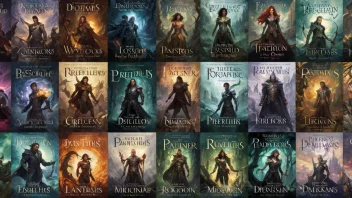Mentorship is a powerful theme that resonates deeply within the realm of young adult (YA) fiction. As adolescents navigate the tumultuous waters of identity, relationships, and independence, the presence of a mentor can provide essential guidance and support. This article delves into the multifaceted role of mentorship in YA literature, exploring how these relationships shape characters, influence narratives, and reflect broader societal themes.
Understanding Mentorship in YA Fiction
At its core, mentorship in YA fiction refers to the dynamic relationship between a more experienced individual and a younger character who seeks guidance. This relationship can manifest in various forms, from the traditional teacher-student dynamic to friendships that transcend age differences. Mentors often serve as catalysts for growth, offering wisdom, encouragement, and sometimes even tough love. They help protagonists discover their strengths, confront their weaknesses, and ultimately forge their paths.
The Archetypes of Mentorship
In YA literature, mentors can be categorized into several archetypes, each serving distinct narrative purposes:
- The Wise Teacher: Often found in school settings, this archetype embodies knowledge and authority. They guide protagonists academically and morally, helping them navigate complex social landscapes.
- The Reluctant Mentor: This mentor may initially resist their role but ultimately finds purpose in guiding the protagonist. Their journey often mirrors the protagonist's, highlighting themes of personal growth.
- The Peer Mentor: Sometimes, mentorship comes from those who are closer in age, highlighting that wisdom can come from shared experiences rather than hierarchical relationships.
- The Unlikely Mentor: This character might not fit the traditional mold of a mentor but offers crucial support through unconventional means, often challenging societal norms.
Key Themes Explored Through Mentorship
Mentorship in YA fiction often encapsulates several key themes that resonate with young readers:
- Identity Formation: Mentors help protagonists explore their identities, encouraging them to embrace their true selves amid societal pressures.
- Resilience and Growth: Through mentoring relationships, characters learn to overcome obstacles and failures, illustrating the importance of perseverance.
- Interpersonal Relationships: The dynamics between mentors and mentees shed light on various types of relationships, including friendship, familial ties, and romantic interests.
- Social Justice and Activism: Many YA novels feature mentors who guide protagonists in understanding and fighting against social injustices, emphasizing the role of young people in instigating change.
Examples of Mentorship in Popular YA Novels
To better understand the significance of mentorship in YA fiction, let’s examine a few notable examples:
1. The Perks of Being a Wallflower by Stephen Chbosky
In this coming-of-age novel, Charlie, the protagonist, finds mentorship in his older friends, Patrick and Sam. They introduce him to new experiences and help him navigate the complexities of adolescence. Their guidance is crucial for Charlie's emotional growth, showcasing how peer mentorship can profoundly impact a young person's journey.
2. Harry Potter Series by J.K. Rowling
The mentorship theme is prevalent throughout the Harry Potter series, with figures like Dumbledore and even Snape acting as mentors to Harry. Each character offers different lessons, from the importance of love and sacrifice to understanding the complexities of morality. Dumbledore, in particular, embodies the wise teacher archetype, guiding Harry in his quest against Voldemort.
3. The Hate U Give by Angie Thomas
Starr, the protagonist, grapples with her identity and the social injustices surrounding her. Her mentor, Maverick (her father), plays a crucial role in instilling values of activism and integrity. Through their relationship, the novel explores the importance of mentorship in understanding one’s role in society.
4. The Fault in Our Stars by John Green
In this poignant tale, Hazel Grace Lancaster finds an unexpected mentor in Augustus Waters. Their relationship transcends the typical boundaries of mentorship, becoming a partnership that fosters personal growth and understanding of love and loss. Their interactions highlight the complexity of mentorship, demonstrating how it can evolve into mutual support.
The Impact of Mentorship on Readers
Mentorship in YA fiction not only shapes characters but also influences readers. The portrayal of these relationships can inspire young readers to seek mentors in their own lives or to become mentors themselves. Here are some ways mentorship in literature can impact readers:
- Encouraging Self-Reflection: Readers often see themselves in the struggles and triumphs of protagonists, prompting them to reflect on their own lives and seek guidance from those they admire.
- Fostering Empathy: Understanding the complexities of mentorship can enhance readers’ empathy, helping them appreciate the different roles people play in their lives.
- Inspiring Action: Mentorship narratives often encourage readers to take action, whether it's seeking help during difficult times or stepping up to support peers in need.
Conclusion
The theme of mentorship in young adult fiction is integral to the genre, offering profound insights into the adolescent experience. Through various archetypes and narratives, mentors provide guidance, support, and encouragement, helping protagonists navigate the complexities of growing up. As readers engage with these stories, they are not only entertained but also inspired to reflect on their relationships, seek guidance, and embrace their own journeys of growth. Ultimately, mentorship in YA literature serves as a reminder of the importance of connection, understanding, and the shared human experience in the pursuit of self-discovery.






